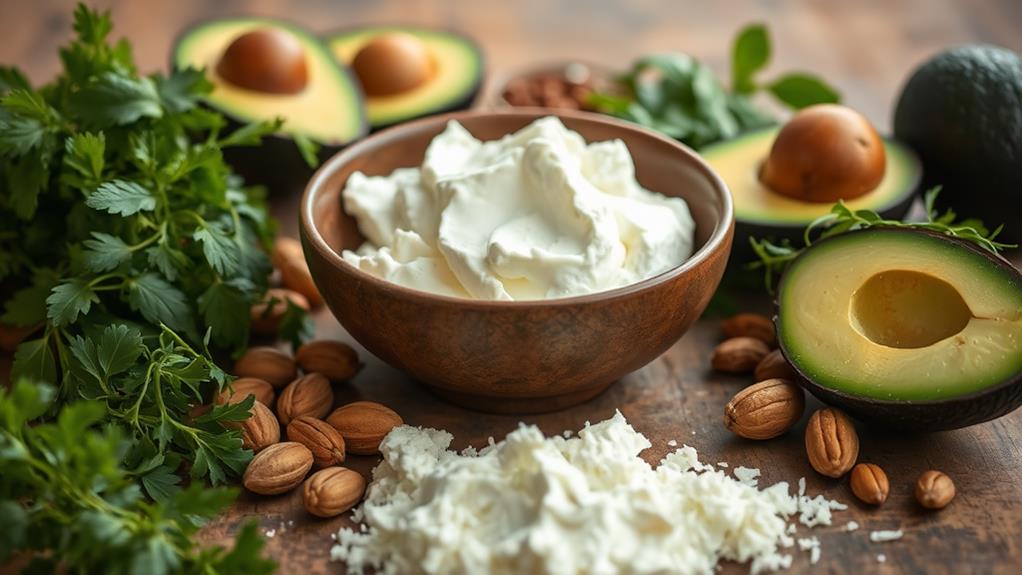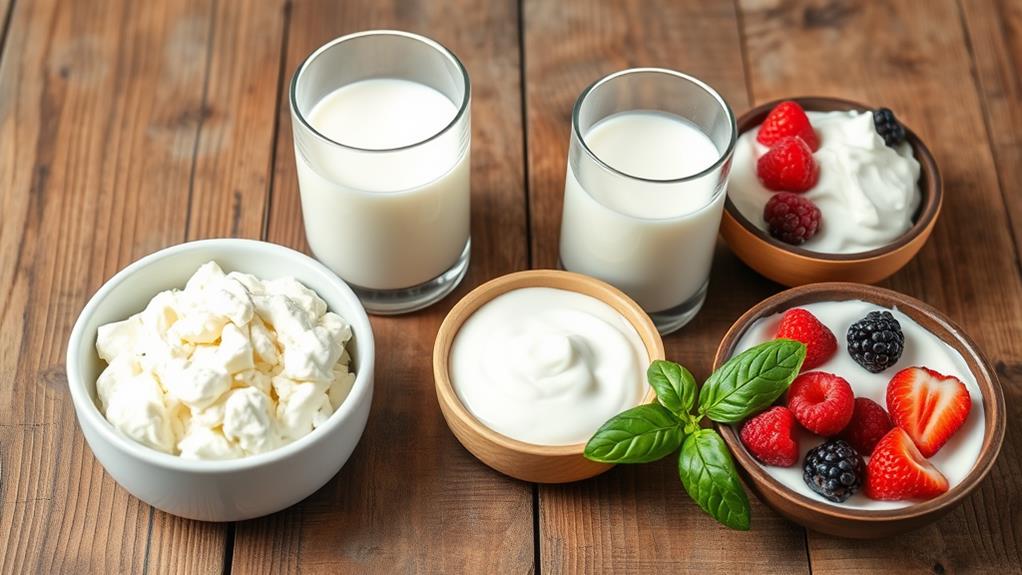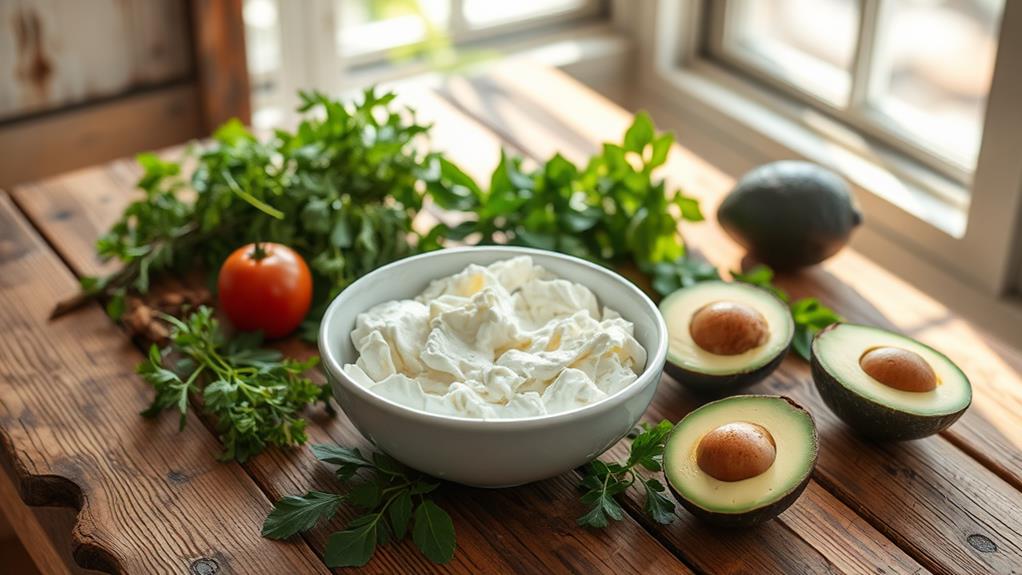Cottage cheese is a fantastic choice for your keto diet because it's low in carbs and high in protein. With about 3.5 grams of carbs per 100 grams, it fits perfectly into your daily limits. One cup provides around 27 grams of protein, helping you feel full and satisfied. Opting for full-fat varieties guarantees you get healthy fats, essential for maintaining ketosis. Pair it with low-carb veggies or healthy fats to boost your meal's nutrition. As you explore its versatility, you'll find plenty of delicious ways to incorporate it into your keto plan.
Overview of Cottage Cheese
Cottage cheese's creamy texture and mild flavor make it a favorite among many looking for a versatile dairy option. This fresh cheese, made from curds, is particularly appealing if you're following a Keto or low-carb diet. With about 28 grams of protein and only 6 grams of carbohydrates per cup, it offers a high-protein, low-carb choice that fits well into various meal plans.
Additionally, its high-fat content can provide a sustained energy source, aligning well with high-fat dairy products that support keto adherence.
Cottage cheese comes in different fat percentages, including full-fat, low-fat, and non-fat, allowing you to choose based on your preference for fat content and overall nutrition. Each option provides essential nutrients, such as calcium and phosphorus, which are crucial for bone health.
The versatility of cottage cheese means you can easily incorporate it into both savory and sweet recipes, making it a fantastic addition to your meals and snacks.
Whether you mix it with fruits, add it to salads, or use it as a base for dips, cottage cheese enhances flavors and boosts your intake of healthy fats. Embracing this dairy option can help you enjoy delicious dishes while sticking to your Keto lifestyle.
Nutritional Benefits of Cottage Cheese
Packed with essential nutrients, cottage cheese offers impressive nutritional benefits that align well with a keto-friendly diet. With approximately 3.5 grams of carbs per 100 grams, it's low in carbs, making it a suitable option for anyone looking to maintain a ketogenic lifestyle. A typical half-cup serving of full-fat cottage cheese contains around 5 grams of carbs and provides about 14 grams of protein, which supports muscle maintenance and keeps you feeling full.
Additionally, the ketogenic diet promotes fat burning and muscle recovery, aligning perfectly with the benefits of cottage cheese as a protein source that aids in these processes improved muscle recovery.
Cottage cheese is high in casein protein, digesting slowly to promote satiety and aid in muscle recovery and growth. Opting for full-fat cottage cheese not only meets your high-fat requirements but also serves as a source of healthy fats, essential for your macronutrient profile on a keto diet.
Additionally, cottage cheese varieties rich in probiotics can enhance gut health, which is beneficial for overall digestion. This can further support weight management, an important aspect of the ketogenic approach.
When you incorporate cottage cheese into your meals, you're not just enjoying a versatile ingredient; you're also fueling your body with nutrients that help you thrive on your keto journey.
Cottage Cheese and the Keto Diet

When you're following a ketogenic diet, incorporating cottage cheese can be a game-changer due to its low carb content and high protein profile. Cottage cheese on keto is an excellent choice, as it contains approximately 3.5 grams of carbs per 100 grams, making it a suitable low-carb dairy option. A half-cup serving of full-fat cottage cheese typically has around 5 grams of carbs, allowing you to easily fit it within your daily carb limit.
Additionally, the keto diet shifts energy reliance to fats, which can further enhance cognitive function and mental performance, leading to better overall productivity while enjoying your meals. Reports indicate improved concentration and memory, which can be beneficial when incorporating snacks like cottage cheese into your diet cognitive enhancement and mental clarity.
The high protein content, around 27 grams per cup, supports muscle building and keeps you feeling full longer, which is essential for sticking to your low-carb eating plan. Opt for full-fat versions, as they provide healthy fats that align perfectly with the macronutrient goals of the ketogenic diet.
To make the most of cottage cheese, consider pairing it with low-carb vegetables or healthy fats, which can enhance its nutritional profile and help you stay in ketosis. Always check the nutrition label to confirm the grams of carbs per serving, ensuring you stay on track with your keto journey. Enjoy cottage cheese as a versatile and satisfying addition to your meals!
Carb Content Comparison
In comparing carb content across various dairy options, cottage cheese stands out as a keto-friendly choice. With about 3.5 grams of carbs per 100 grams, it's an excellent low-carb option for your ketogenic diet.
Understanding carbohydrate content is essential for making dietary choices that support ketosis, and a half-cup serving of full-fat cottage cheese contains approximately 5 grams of carbs, making it easy to fit into your daily carb limits.
Here are three reasons why cottage cheese is a smart choice:
- Low Carb Content: Compared to other dairy products like yogurt or milk, cottage cheese has notably lower carbs per cup.
- Full-Fat Benefits: Opting for full-fat cottage cheese guarantees you avoid added fillers or sugars often found in low-fat versions, keeping your carb intake minimal.
- Easy Portion Control: With such low carb content, you can enjoy satisfying servings without worrying about exceeding your daily carb limits.
Portion Control Tips

How can you effectively manage your cottage cheese portions while staying in ketosis? Start by sticking to a serving size of ½ cup of full-fat cottage cheese, which contains about 5 grams of carbs. This amount is manageable within your daily carb limits on a low-carb diet.
Keep a close eye on your daily intake, as exceeding your carb count can disrupt ketosis. Incorporating meal planning strategies can help you better track your servings and guarantee you remain within your macro goals.
It's essential to factor cottage cheese into your total daily carb count. Avoid flavored varieties, as they often have added sugars that greatly increase the carb content. Instead, reach for plain, full-fat options to stay keto-friendly.
Incorporate cottage cheese into meals with low-carb vegetables or healthy fats like avocado or nuts. This won't only enhance your meal but also keep your carb levels low.
Regularly reassess your portion size based on your individual dietary needs and activity levels. This way, you can guarantee you stay within your target macro distribution for a successful keto diet.
Keto-Friendly Recipes
When you're looking for breakfast ideas, cottage cheese can be a game-changer. It pairs wonderfully with keto-friendly ingredients, such as savory keto bread recipes made with almond flour for a filling start to your day.
Think pancakes made with almond flour or smoothies packed with spinach for a protein boost.
For savory dishes, consider stuffed bell peppers or a fresh avocado salad to keep your meals delicious and keto-friendly.
Breakfast Ideas With Cottage Cheese
Cottage cheese is a versatile ingredient that can transform your breakfast routine while keeping it keto-friendly. It's packed with protein and healthy fats, making it an ideal choice for your low-carb meals.
Here are three delicious breakfast ideas you'll love:
- Cottage Cheese Pancakes: Mix ½ cup of full-fat cottage cheese with almond flour for pancakes that boast just 3 grams of carbs each. You'll enjoy a fluffy, satisfying breakfast.
- Berry Bowl: Combine cottage cheese with fresh berries and a sprinkle of nuts. This nutritious bowl not only keeps your carb intake low but also provides essential nutrients and healthy fats.
- Avocado Salad: Toss together cottage cheese, diced avocado, cucumber, and an olive oil dressing. This invigorating dish offers a high-fat, low-carb option that's perfect for starting your day right.
You can also whip up a creamy cottage cheese and almond butter dip for a quick keto-friendly snack with low-carb veggies.
With these breakfast ideas, you'll fuel your day while sticking to your keto goals!
Savory Dishes for Keto
Savory dishes can elevate your keto meal plan, and cottage cheese is an excellent ingredient to incorporate. It's not only low-carb but also high-protein, making it a perfect choice for satisfying meals.
One delicious option is stuffed bell peppers, where you can mix cottage cheese with spinach and your favorite spices for a hearty dish.
You can also whip up a creamy spinach and garlic dish that enhances the flavor profile while sticking to keto principles.
For a light and invigorating salad, combine cottage cheese with avocado and cucumber to introduce healthy fats and invigorating flavors.
If you're in the mood for snacking, try creating a flavorful dip by blending cottage cheese with roasted red peppers and spices. It pairs perfectly with veggies for a satisfying, low-carb treat.
Lastly, don't forget about cottage cheese pancakes made with almond flour. They provide a tasty breakfast option that maintains low carb content while being high in protein.
With these savory dishes, cottage cheese can truly shine in your keto-friendly meal plan.
Alternative Dairy Options

When considering alternative dairy options, you'll find several low-carb choices that can complement your keto diet.
Cream cheese, cheddar, and brie all offer minimal carbs while adding rich flavors to your meals.
Comparing these with cottage cheese can help you choose the best options for your nutritional needs.
Nutritional Comparisons With Cottage Cheese
Exploring alternative dairy options can reveal how cottage cheese stands out as a keto-friendly choice. With its low carbohydrate content, it offers a delicious way to enjoy dairy without compromising your diet.
Here's why you should consider cottage cheese:
- Low-Carb Delight: Cottage cheese typically has about 3.5 grams of carbs per 100 grams, making it a better option than Greek yogurt, which can have around 10 grams per 1/2 cup.
- Protein Boost: Full-fat cottage cheese provides approximately 6 grams of carbs per 1/2 cup, but it's packed with protein, offering a satisfying meal or snack.
- Comparative Advantage: Ricotta cheese, with 8-9 grams of carbs per 1/2 cup, falls short as a keto-friendly alternative compared to cottage cheese.
While cream cheese boasts even lower carbs at about 1 gram per ounce, it lacks the substantial protein boost that cottage cheese provides.
Nutrition experts often recommend cottage cheese for those on strict keto diets, thanks to its balance of low carbs and high protein.
Low-Carb Dairy Alternatives
For those on a keto diet, finding low-carb dairy alternatives can enhance meals while keeping your carb count in check. Full-fat cottage cheese, for example, is a popular choice because it contains moderate protein and is low in carbs. However, you'll find other low-carb dairy alternatives that can also fit your ketogenic diet seamlessly.
Cream cheese is a fantastic option, boasting just 1 gram of carbs per ounce, making it perfect for spreads or dips. Sour cream, with approximately 1-2 grams of carbs per tablespoon, adds creaminess to your dishes without jeopardizing your carb limits.
If you enjoy yogurt, opt for unsweetened Greek yogurt in moderation; it typically contains about 4 grams of carbs per 100 grams. Ricotta cheese can be included, too, but stick to whole-fat versions, as it contains around 6 grams of carbs per half-cup.
For a dairy-free choice, tofu is low in carbs at about 1.9 grams per 100 grams. With these low-carb dairy alternatives, you can enjoy the health benefits of cheese while keeping your meals aligned with your keto goals.
Considerations for Cottage Cheese
Cottage cheese can be a valuable addition to your ketogenic diet, but there are important considerations to keep in mind.
First, you'll want to choose full-fat cottage cheese to align with the keto macronutrient ratio, aiming for about 70-75% fats.
Second, watch your portion control; a recommended serving size is about ½ cup to help maintain your low-carb goals.
Finally, be mindful of your protein intake, as excessive amounts can lead to gluconeogenesis, potentially throwing you out of ketosis.
Here are three key points to remember:
- Opt for full-fat: It's richer in healthy fats, which is essential for your keto lifestyle.
- Practice portion control: Stick to about ½ cup to keep your carb intake in check.
- Combine wisely: Pair cottage cheese with low-carb veggies or healthy fats like nuts or avocado to boost nutrition while staying within keto guidelines.
Conclusion
In the world of keto, cottage cheese shines like a hidden gem, offering creamy delight without the carb burden. Its nutritional benefits and versatility make it a perfect companion on your low-carb journey. Just remember to keep an eye on portions, and don't shy away from experimenting with flavors. Whether you're whipping up a savory dish or indulging in a sweet treat, cottage cheese can elevate your meals while keeping you firmly on track with your keto goals.







